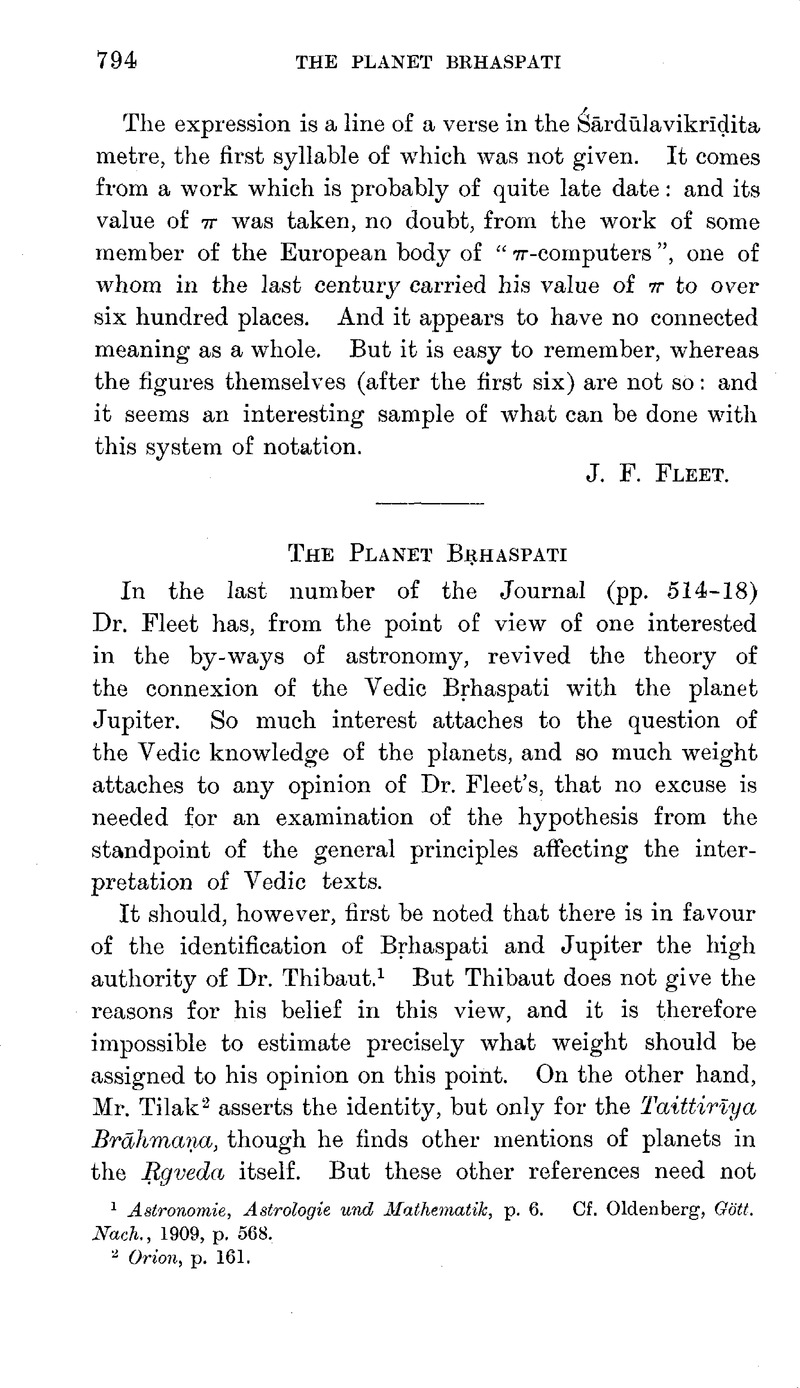No CrossRef data available.
Published online by Cambridge University Press: 15 March 2011

page 794 note 1 Astronomie, Astrologie und Mathematik, p. 6. Cf. Oldenberg, , Gött. Nach., 1909, p. 568Google Scholar.
page 794 note 2 Orion, p. 161.
page 795 note 1 iv, 50, 4.
page 795 note 2 iii, 1, 1, 5. The verse does not occur elsewhere.
page 795 note 3 Not also in the Taittirīya Saṃhitā, as suggested on p. 515, n. 1.
page 795 note 4 ii, 8, 2, 7; Maitrāyaṇī Saṃhitā, iv, 12, 1; Kāṭhaka Saṃhitā, xi, 13.
page 796 note 1 Taittirīya Saṃhitā, iv, 4, 10, 1; Kāṭhaka Saṃhitā, xxxix, 13; Maitrāyaṇi Saṃhitā, ii, 13, 20.
page 797 note 1 RV. viii, 72, 16: sūryasya saptá rasmíbhiḥ.
page 797 note 2 Cf. RV. iii, 6, 2; Vājasaneyi Saṃhitā, xvii, 79; Taittirīya Saṃhitā, i, 5, 2, 4; Kāṭhaka Saṃhitā, vii, 14, and often.
page 797 note 3 See Macdonell, , Vedic Mythology, p. 92Google Scholar. The lightning is born from the celestial Agni. It may be noted that jyótiṣah is most probably gen., not abl. Cf. RV. vii, 36, 3: mahó diváḥ sádane jāyamānaḥ.
page 797 note 4 Ibid., p. 90.
page 797 note 5 See Böhtlingk & Roth's Dictionary, v, 332; Aitareya Āraṇyaka, i, 3, 8; ii, 3, 7, and i, 1, 2, note 10 in my edition.
page 798 note 1 See Macdonell, , Vedic Grammar, p. 107Google Scholar; Delbrück, , Altindische Syntax, p. 47Google Scholar. Whitney, Sanskrit Grammar, § 1083a, is less precise than usual. The same rule prevails in the Atharvaveda, Whitney, AVPr. 185.
page 798 note 2 Weber, , Ind. Stud., xiii, 62 seqGoogle Scholar.
page 798 note 3 v, 54, 13.
page 798 note 4 Raraṃta, as on p. 518, seems to be a misprint. The rendering “gave” is hardly strictly correct; the form must be a perf. imper. from ran, not randhor rā; see Oldenberg, , Rgveda-Noten, i, 351Google Scholar, and cf. Macdonell, , Vedic Grammar, p. 362Google Scholar, Whitney, Sanskrit Grammar, § 813; rārandhí in RV. x, 59, 6; the sense is “make wealth enjoy itself with us”.
page 798 note 5 Yuchāti is not desirable (cf. Oldenberg, loc. cit.), for the present gives a perfectly good sense, describing the kind of wealth, and accords best with the sentence, making the construction of the comparison simple and easy.
page 799 note 1 Cf. Delbrück, , Altindische Syntax, pp. 594, 595Google Scholar. Cf. also RV. i, 143, 5: ná yó várāya marútām iva svanáḥ séneva sṛṣṭā divyā yáthāśániḥ, where na likewise must be taken with the comparison.
page 799 note 2 RV. x, 85, 13.
page 799 note 3 xiv, 1, 13. See references in Whitney's translation, p. 742.
page 799 note 4 See e.g. Arnold, , Vedic Metre, p. 287Google Scholar; Macdonell, , Sanskrit Literature, p. 34Google Scholar. RV. v, 54, is one of the Atri collection, and though perhaps not a very early member of that group, is certainly older than x, 85.
page 800 note 1 For the question of Tiṣya = Tistrya = Sirius, cf. my Sāṅkhāyana Āraṇyaka, p. 77; Max Müller, SBE. xxxii, 331, and other references in SBE. 1, 582, 583.
page 800 note 2 x, 64, 8, with Krśānu. See Weber, , Naxatra, ii, 289 seqGoogle Scholar. Ludwig identifies him with Krśānu, but cf. Hillebrandt, Ved. Myth, ii, 207, 208.
page 800 note 3 For further discussion of the question of the planets and the Nakṣatras in the RV., I may refer to the forthcoming Vedic Index (i, 243, 244, 409 seq.) of Professor Macdonell and myself.